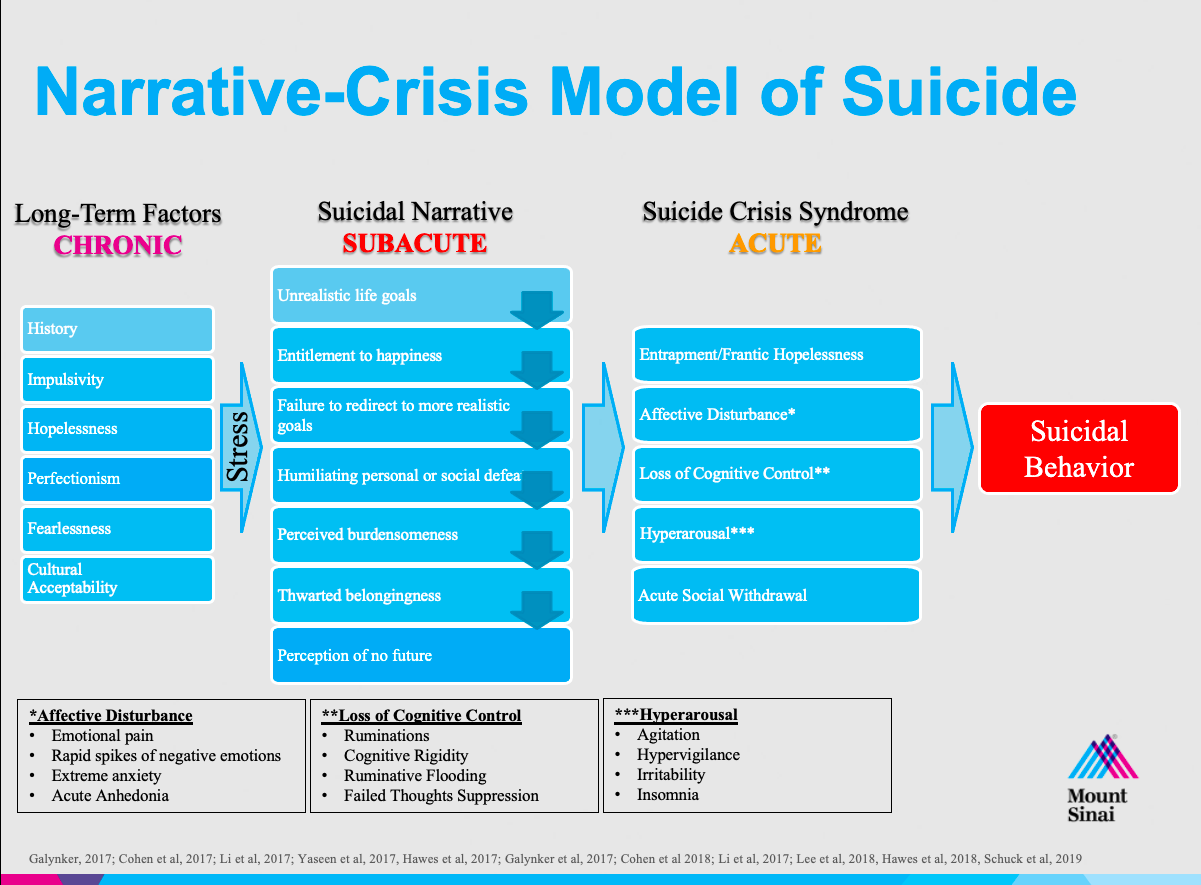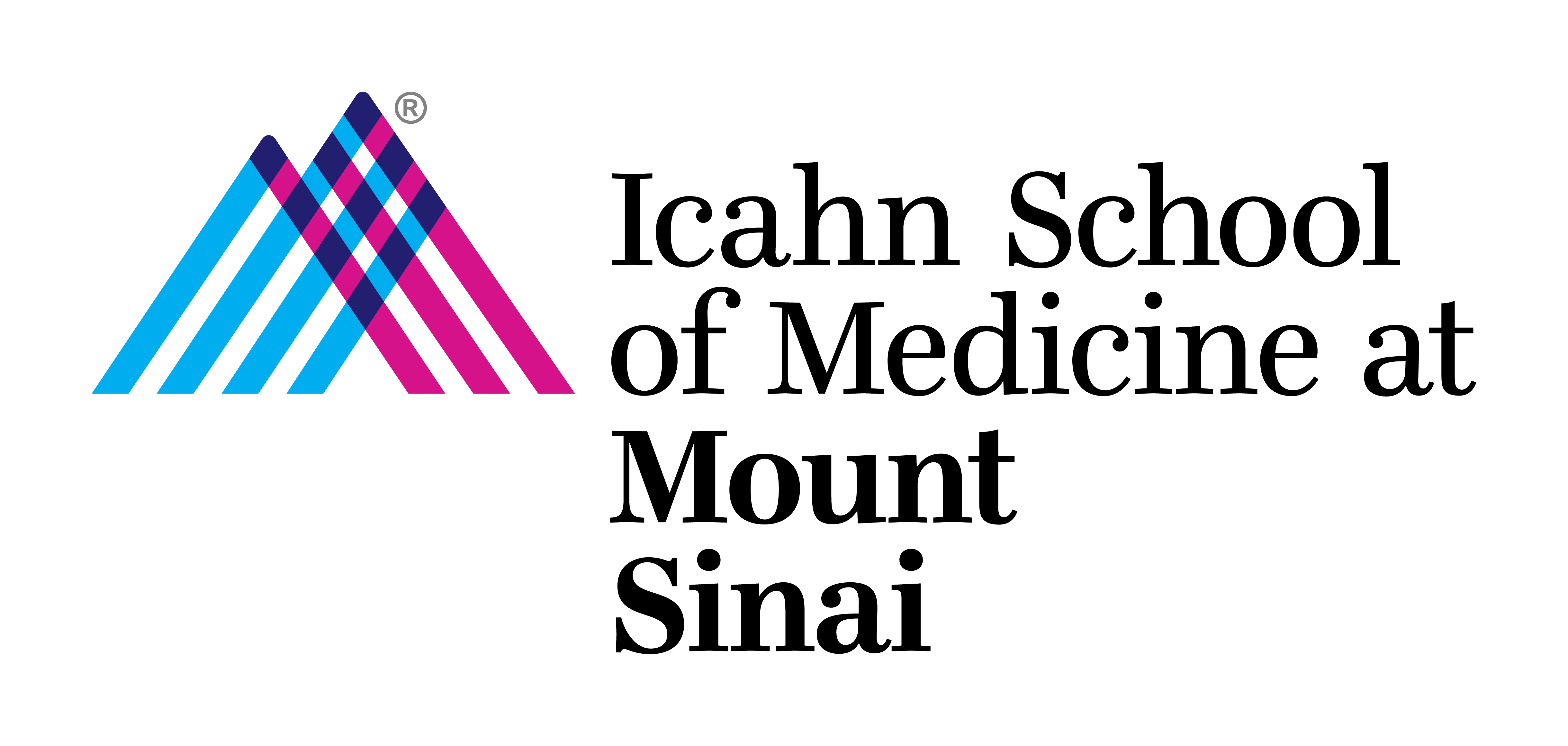Research Studies
Imminent Suicide Risk Assessment in high-risk individuals denying suicidal ideation or intent: Introduction and Training
According to the recent Center for Disease Control (CDC) report, more than half of suicide decedents between 2000 and 2016 were never diagnosed with a mental health condition, and only a quarter disclosed suicide intent prior to ending their lives. These striking findings challenge the practice of using suicidal ideation as a cornerstone of suicide risk assessment, and may partially account for our failure to contain the increase in US suicide deaths. The CDC report also underscores the urgent need for innovative suicide risk assessment methods that do not rely on a history of mental illness or self-reported suicidal ideation/intent.
The proposed course aims to train clinicians in a novel framework for the assessment of short-term suicide risk: the Modular Assessment of Risk for Imminent Suicide (MARIS) and the Narrative- Crisis Model of suicidal behavior (NCM). The effectiveness of the MARIS-NCM approach is described in multiple peer-reviewed publications, and in the book The Suicidal Crisis by Galynker (2017; Oxford University Press), now a recommended resource by the American Foundation for Suicide Prevention.
We will open conceptual framework of the course by polling the audience on their experience with imminent risk assessment and presenting a video of a person with lived experience describing her reasons for concealment of her suicidal intent. We’ll then present an overview of the research findings supporting the NCM model, the new clinical entity of SCS and the MARIS method for the assessment of imminent suicidal risk. We will then conduct practical training in the SCS and of the Suicidal Narrative using the video of simulated patient “Irina” followed by didactic role-play practice case “Gary.” Next we will describe the use of clinicians’ emotional responses as tools for assessment and management of imminent suicidal behavior as well as clinicians’ psychological defense mechanisms elicited by suicidal patients following by practical training in emotional self-awareness. The class will conclude with Section Four devoted to participants’ evaluating their acquired skills through risk-assessment evaluation of provided test cases “Kate” and “Bernie”.
See Resources page for more
The Time Course of Emotional Distress Prior to Suicidal Behavior
Acute and subacute emotional distress are important to access in terms of identifying who is exactly at high risk for experiencing a mental health crisis. In this study, acute emotional distress will also be referred to as the Suicide Crisis Syndrome (SCS), and subacute emotional distress will also be referred to as the Suicidal Narrative (SN). Obtaining such knowledge is essential for both the design and implementation of targeted pharmacological and psychotherapeutic treatments of acute and subacute emotional distress preceding suicidal behavior.
The primary aim of this study is to determine the time course of acute and subacute emotional distress as well as their component symptoms over the four weeks preceding suicidal behaviors as well as assess their relationship with suicidal behavior lethality. The secondary aims are to establish clinical significance of the onset of acute and subacute emotional distress to prevent suicide in the future, as well as to explore the utility of computational assessments for identifying patterns of emotional distress among suicidal inpatients.
The MARIS Project: The Modular Assessment of Risk for Imminent Suicide
Our lab is actively examining a multi-informant model, the MARIS-NCM, or, the Modular Assessment of Risk for Imminent Suicide (MARIS) and the Narrative-Crisis Model of suicidal behavior (NCM). The effectiveness of the MARIS-NCM approach is described in multiple peer-reviewed publications, and in the book The Suicidal Crisis by Galynker (2017; Oxford University Press), now a recommended resource by the American Foundation for Suicide Prevention.
Throughout the course of MARIS, we have identified the Suicide Crisis Syndrome (SCS), which is comprised of several factors predictive of imminent suicidal behavior (SB). Our aim now is to propose and substantiate this SCS. What precipitates this syndrome is a suicidal narrative; the concept of such a narrative postulates that individuals each possess a story of self, and a suicidal narrative is the coherent cognitive structure in which the representation of self becomes sufficiently distressing, such that suicide becomes a viable option. Overall, the narrative-crisis model comprises enduring characteristics that make an individual susceptible to suicide.
The Y-MARIS (Young MARIS) and MARIS in Adolescents
In collaboration with an AFSP award recipient Dr. Alan Apter in Israel, we have initiated a prospective bi-national imminent risk assessment study in high-risk Israeli and American adolescents. We have modified the MARIS to make it appropriate for children and adolescents. The study is ongoing and the interim data will be ready in 2020. Colleague Dr. Gennadiy Bannikov in Moscow has initiated suicide screening of children and adolescents in Russian schools. In interim analysis, MARIS was predictive of suicidal ideation and behavior. Notably, a child’s crisis syndrome differs from an adult’s – social isolation seems a stronger predictor than feelings of entrapment and frantic hopelessness.
Emotional Safety Course
Inpatients meeting the proposed DSM criteria for the SCS at discharge and denying suicidal ideation were seven times more likely to attempt suicide within one month. The MARIS and assessment of the SCS as well as clinician responses to same, has even higher predictive validity. There is a notable contrast between outcome and self-reported intention, and the SCS appears to capture a specific moment of suicidal crisis predictive of imminent behavior.
In this context, we have now initiated several studies of suicide prevention in high-risk patients who meet the proposed DSM SCS criteria but may deny suicidal ideation.
Currently, the lab has and is conducting multisite studies, in Trondheim (Norway) and New York City, examining the implementation and efficacy of an Emotional Safety Course for Suicide Prevention (ESC-SP).
The study aims to answer the following research questions:
- Is the SCS-C a test with higher sensitivity than suicidal intention assessment – can we detect suicide earlier?
- Will the MiniMARIS measure have incremental predictive validity over the DSM SCS?
- Is treatment inclusive of the ESC-SP a better intervention that the original safety plan in preventing short-term suicidal behaviors?
Virtual Interaction Training in Emotional Self-Awareness for Working with Suicidal Patients
MARIS has also revealed a need for clinician training in the effective management of negative emotions towards suicidal patients, which can yield improved suicidal outcomes. This training should be accessible and easy to disseminate, for clinicians everywhere. Therefore, in an effort to address the need for emotional awareness and emotional management training, we have established collaborations with AFSP grant recipient Dr. Adriana Foster of Florida International University and Dr. Benjamin Lock of Florida State University. We have two running projects, “Impact of Clinician Virtual Human Interaction Training in Emotional Self-Awareness on Patients’ Suicidal Ideation and Suicide Crisis Syndrome: a Randomized Controlled Trial” and “Virtual Interaction Training in Emotional Self-Awareness for Working with Suicidal Patients”.
Throughout the course of MARIS, we have identified the Suicide Crisis Syndrome (SCS), which is comprised of several factors predictive of imminent suicidal behavior (SB). Our aim now is to propose and substantiate this SCS. What precipitates this syndrome is a suicidal narrative; the concept of such a narrative postulates that individuals each possess a story of self, and a suicidal narrative is the coherent cognitive structure in which the representation of self becomes sufficiently distressing, such that suicide becomes a viable option. Overall, the narrative-crisis model comprises enduring characteristics that make an individual susceptible to suicide.

